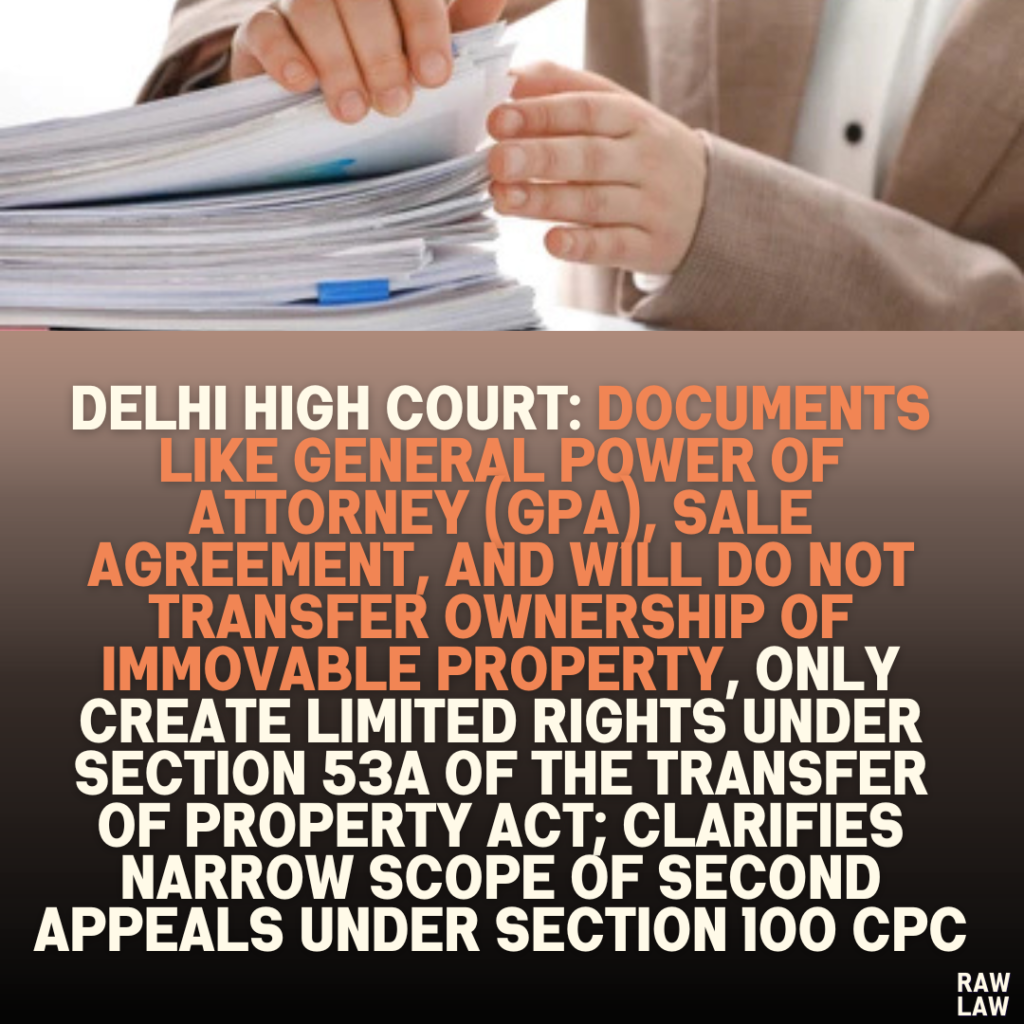Court’s Decision
The Delhi High Court dismissed a second appeal filed by the appellants, who claimed ownership of the suit property based on documents such as General Power of Attorney (GPA), Sale Agreement, and Will. The court ruled that these documents do not confer ownership under the law and upheld the Trial Court’s decree, which awarded possession and mesne profits to the respondents. The court also emphasized the restricted scope of second appeals under Section 100 of the Code of Civil Procedure (CPC), which allows intervention only when substantial questions of law are raised. The appellants failed to establish any such substantial question of law.
Facts
- The suit property, located in Jahangirpuri, Delhi, was originally allotted by the Delhi Development Authority (DDA) to the respondents’ predecessor, Shri Satpal.
- After Shri Satpal’s death, his legal heirs (respondents) claimed ownership and sought possession from the appellants, who were in unauthorized occupation of the property.
- The appellants claimed ownership through documents such as GPA, Sale Agreement, and Will, purportedly transferred through intermediaries.
- The Trial Court ruled in favor of the respondents, holding that the appellants had no valid title. The judgment was upheld by the first Appellate Court.
Issues
- Can ownership of immovable property be claimed based on unregistered GPA, Sale Agreement, and Will?
- Does Section 50 of the Delhi Rent Control Act oust the jurisdiction of the Civil Court in this case?
- Was the suit defective due to non-joinder of the original tenant as a necessary party?
- Did the appellants raise substantial questions of law justifying a second appeal?
Petitioner’s Arguments (Appellants)
- The appellants argued that the suit property was legally transferred to them via GPA, Sale Agreement, and Will.
- They contended that the Civil Court lacked jurisdiction due to the bar under Section 50 of the Delhi Rent Control Act, as the property was previously rented.
- They alleged that the original tenant was not made a party to the suit, rendering it defective for non-joinder of necessary parties.
Respondent’s Arguments
- The respondents maintained that they were the legal heirs of the original allottee and, therefore, the rightful owners of the property.
- They contended that the appellants’ reliance on GPA, Sale Agreement, and Will was legally untenable as such documents do not confer ownership unless duly registered.
- The respondents asserted that the relationship between the parties was not one of landlord-tenant, making the bar under Section 50 of the Delhi Rent Control Act inapplicable.
Analysis of the Law
- Invalidity of GPA-Based Transactions: The court reiterated the Supreme Court’s holding in Suraj Lamp & Industries Pvt. Ltd. v. State of Haryana, which established that documents like GPA, Sale Agreement, and Will do not transfer ownership of immovable property. These documents can only create limited rights under Section 53A of the Transfer of Property Act.
- Jurisdiction Under Section 50 of the Delhi Rent Control Act: The court held that Section 50, which restricts Civil Court jurisdiction in landlord-tenant disputes, was inapplicable because:
- There was no landlord-tenant relationship between the parties.
- The appellants claimed ownership, thereby repudiating any tenancy relationship.
- Non-Joinder of Necessary Parties: The court rejected the appellants’ argument, holding that the original tenant was not a necessary party since the respondents sought possession from the appellants as unauthorized occupants.
- Scope of Second Appeals Under Section 100 CPC: The court emphasized that second appeals can only be entertained if they involve substantial questions of law. It cited several precedents to illustrate that mere errors in factual findings or disagreements over evidence do not qualify as substantial questions of law.
Precedent Analysis
- Suraj Lamp & Industries Pvt. Ltd. v. State of Haryana (2012): Established that GPA, Sale Agreement, and Will cannot substitute for a registered deed of conveyance in property transfers.
- S. Makhan Singh v. Smt. Amarjeet Bali (2008): Held that denial of a landlord-tenant relationship forfeits tenancy protections under the Delhi Rent Control Act.
- Roop Singh v. Ram Singh (2000): Clarified that Section 100 CPC limits second appeals to cases involving substantial questions of law and does not allow reappraisal of evidence.
- Bholaram v. Amirchand (1981): Highlighted that even gross factual errors do not justify interference in second appeals unless substantial legal issues are involved.
Court’s Reasoning
- The court found that the appellants’ possession of the property was unauthorized, as their claim was based on invalid documents.
- The appellants failed to show any substantial question of law. The issues raised pertained to factual findings already settled by the Trial and Appellate Courts.
- Both lower courts were consistent in their findings, and no exceptional circumstances warranted interference.
Conclusion
The Delhi High Court dismissed the appeal, upholding the concurrent findings of the Trial and Appellate Courts. It ruled that the appellants’ reliance on invalid GPA transactions did not confer ownership and that the respondents, as legal heirs of the original allottee, were entitled to possession and mesne profits.
Implications
- This judgment reaffirms the illegality of GPA-based property transactions and emphasizes the need for valid registration of property transfers.
- It clarifies that second appeals under Section 100 CPC have a narrow scope, restricted to cases involving substantial questions of law.
- The ruling strengthens the legal position of rightful heirs in property disputes against unauthorized occupants relying on invalid documentation.
